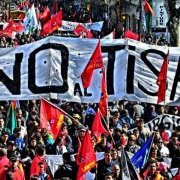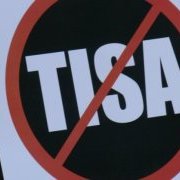
TiSA: Trade in Services Agreement
TiSA is a new trade agreement being negotiated on services. The TiSA talks are taking place outside the frame of the World Trade Organisation and its General Agreement on Trade in Services (GATS), even though they began among a group of WTO members. TiSA is explicitly meant to go beyond the WTO/GATS. If it is finalised, it may eventually become part of the WTO or simply stand on its own, but either way, its provisions will certainly be carried into other bilateral and plurilateral trade deals.
The countries negotiating TiSA are: Australia, Canada, Chile, Colombia, Costa Rica, European Union, Hong Kong, Israel, Japan, Liechtenstein, Mexico, New Zealand, Norway, Pakistan, Panama, Peru, South Korea, Switzerland, Taiwan, Turkey and the United States. These countries account for about two-thirds of global trade in services. However, major world economies such as China, India or Brazil are not present in these negotiations and that the BRICS and ASEAN groupings are not included. In September 2015, Uruguay and Paraguay dropped out of the TiSA negotations, after massive popular opposition to the deal.
TiSA seeks the elimination of regulations and national legislation concerning services. There is a strong North-South asymmetry in the negotiating positions, creating significant distortions in the manoeuvring space that governments have to design and implement domestic policies in a wide variety of topics. TiSA’s “sectoral annexes” (key chapters) are: movement of persons, financial services, telecommunications, shipping, air services, postal services, professional services, electronic commerce, freight, public procurement, environment, direct distribution, subsidies, energy and services related to health. In addition to the “sectoral annexes”, the parties are negotiating other “specific disciplines” such as domestic regulation, transparency and location. The United States is particularly interested in liberalisation of financial services, information and communication technology, postal services and seeing progress on domestic regulation. The European Union also has a strong interest in liberalising financial services. Both the EU and the US are home to transnational leaders in these sectors, so they would gain the most.
Of particular concern are the “status quo” clause, the “ratchet” clause, “national treatment” and the use of “negative lists”. This approach involves making commitments based on lists indicating sectors which each negotiating party wants to exclude from the negotiations. It creates major distortions and departs from the provisions of the multilateral framework of the WTO. These clauses and the negative list approach are meant to secure greater and deeper market openings, liberalisation and deregulation, at the same time reducing the role of the state.
Wikileaks has played a critical role in exposing the draft TiSA texts under negotiation and helping to provide analysis and understanding of what is at stake. In many countries, labour unions are on the front line of the resistance to TiSA because so many people are employed in the service sector. Whether they are people working in the ports of Canada or the hospitals of India, TiSA directly threatens to take away jobs.
Eventually the negotiations failed in 2016 and they have been put on hold since then because the governments of the rich countries could not agree among themselves.
with the contribution of REDES (Friends of the Earth, Uruguay)
last update: August 2020
Photo: Public Eye


















